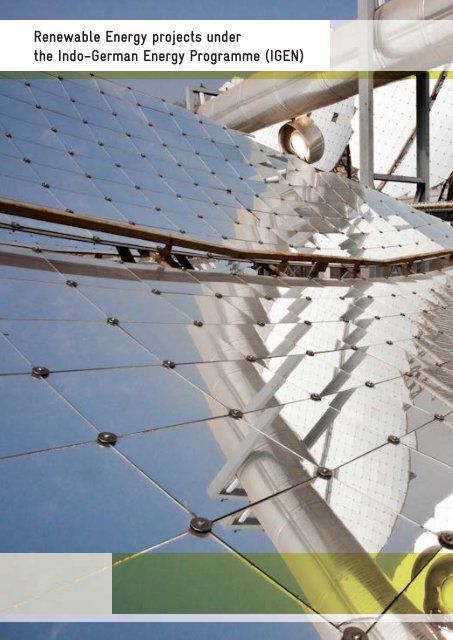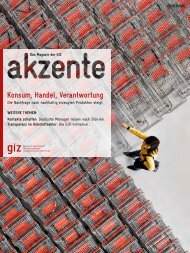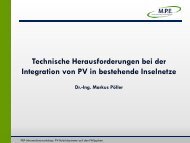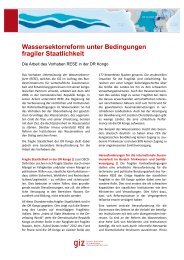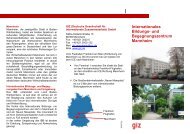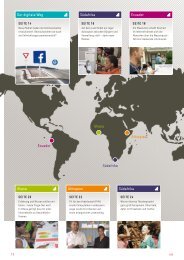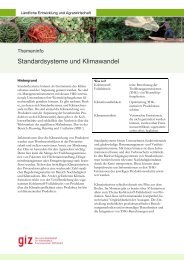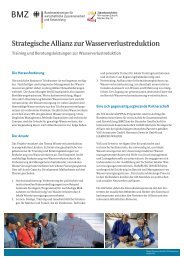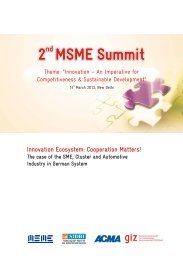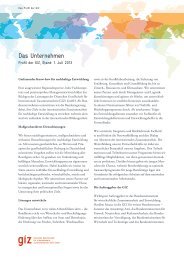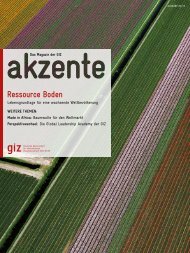Renewable Energy projects under the Indo–German Energy ... - GIZ
Renewable Energy projects under the Indo–German Energy ... - GIZ
Renewable Energy projects under the Indo–German Energy ... - GIZ
Create successful ePaper yourself
Turn your PDF publications into a flip-book with our unique Google optimized e-Paper software.
<strong>Renewable</strong> <strong>Energy</strong> <strong>projects</strong> <strong>under</strong><br />
<strong>the</strong> <strong>Indo–German</strong> <strong>Energy</strong> Programme (IGEN)
From 2003, <strong>the</strong> Development Cooperation has put more focus on <strong>the</strong> energy sector through <strong>the</strong> Indo German <strong>Energy</strong><br />
Programme (IGEN) with <strong>the</strong> aim to, “Expand energy has supply in a socially and environmentally sound manner using<br />
fossil fuels and renewable energy, massively improving efficiency in energy generation, transmission and consumption and<br />
continuing with sectoral reforms”.<br />
To minimise <strong>the</strong> dependency on conventional energy, India is developing strategies for enhanced energy efficiency and greater<br />
use of renewable energy. Momentum for <strong>the</strong> promotion of solar energy comes from <strong>the</strong> National Solar Mission as part of<br />
<strong>the</strong> National Action Plan for Climate Change of <strong>the</strong> Government of India.<br />
Germany is a recognised leader in <strong>the</strong> renewable energy and energy efficiency sector. <strong>GIZ</strong> has over 40 years of firsthand<br />
experience in promoting <strong>projects</strong> in developing countries in this sector. In India, <strong>GIZ</strong> is supporting <strong>the</strong> Ministry of New and<br />
<strong>Renewable</strong> <strong>Energy</strong> (MNRE) in implementing <strong>the</strong> National Solar Mission, and efforts to reduce <strong>the</strong> cost of renewable energy<br />
by combining it with energy efficiency. <strong>GIZ</strong>’s strategy focuses on 3 main areas:<br />
• Development of business and governance models of renewable based electricity for unmet demand for productive<br />
use in rural areas (BMU-RESRA,BMZ-RE);<br />
• Commercialisation of solar energy in urban and industrial areas to make grid connected renewable energy as easily<br />
available as in Germany (BMU-ComSolar); and<br />
• Supporting <strong>the</strong> development of <strong>Renewable</strong> <strong>Energy</strong> Act and o<strong>the</strong>r measures on Policy and regulatory issues, capacity<br />
building paving <strong>the</strong> way for relocation of resources for combined promotion of renewable energy and energy<br />
efficiency (BMZ-RE, BMU-ComSolar).<br />
In 2008, first renewable energy project RESRA (<strong>Renewable</strong> <strong>Energy</strong> Supply for Rural Areas) in association MNRE, Government<br />
of India was initiated to reduce rural poverty by envisaging a rapid, cheap, and climate-friendly energy supply for rural<br />
India. Within two years <strong>the</strong> renewable energy project portfolio expanded to four <strong>projects</strong> with <strong>the</strong> addition of ComSolar<br />
(Commercialisation of Solar <strong>Energy</strong> in Industrial and Urban Areas), SolMap (Solar Mapping and Monitoring) and IGEN-RE<br />
(<strong>the</strong> <strong>Renewable</strong> <strong>Energy</strong> component of IGEN).<br />
Dr. Hermann Herz<br />
Indo-German <strong>Energy</strong> Programme – <strong>Renewable</strong> <strong>Energy</strong><br />
B-5/2, Safdarjung Enclave, New Delhi 110 029, INDIA<br />
T +91 11 4949 5353<br />
E hermann.herz@giz.de<br />
I www.giz.de<br />
New Delhi, June 2012<br />
ExpressBuzz-Print<br />
By Sudha Nambudiri<br />
05 Mar 2011 04:34:40 AM IST<br />
German technology brings water to Lakshadweep<br />
Page 1 of 1<br />
KOCHI: The several islanders in <strong>the</strong> Lakshadweep, who were <strong>under</strong> miseries with no proper solution for potable water for years, are all cheers<br />
for a German technology. They can soon get pure drinking water running in <strong>the</strong>ir house taps with <strong>the</strong> help of a unique solar desalination plant,<br />
developed by a team of Germans. The plant, to be set up at <strong>the</strong> Bitra islands, is capable to produce 5,000 million litres of pure drinking water to<br />
<strong>the</strong> islanders.<br />
The technology will bring relief to nearly 270 people, who had been relying on traditional filtering systems to desalinate <strong>the</strong>ir well water. Unlike<br />
<strong>the</strong> main islands of Kavaratti or Agati, salinated water is a major issue for <strong>the</strong> inhabitants of smaller islands of Lakshadweep.<br />
“We are setting up <strong>the</strong> plant as a part of <strong>the</strong> Indo‐German <strong>Energy</strong> Programme (IGEN) as a pilot project. All it would require is a one‐time<br />
investment and <strong>the</strong>re won’t be much running costs,” Jens Burgtorf, IGEN Director, said.<br />
The plant will give fresh drinking water after heating it at 80 to 85 degree Celsius.<br />
“We have not planned any storage facility as <strong>the</strong> heat from <strong>the</strong> sun will directly boil <strong>the</strong> water. As far as rainy season is concerned, we will work<br />
out on solutions like rainwater harvesting and alternate energy options,” he said.<br />
IGEN is embedded with <strong>the</strong> Bureau of <strong>Energy</strong> Efficiency, Union Power Ministry and working in partnership with <strong>the</strong> designated National<br />
Authority of <strong>the</strong> Indian Ministry of Environment and Forests.<br />
The programme is funded by <strong>the</strong> German Ministry of Economic Cooperation and Development (BMZ) through IGEN/<strong>GIZ</strong> (German International<br />
Cooperation).<br />
“The programme aims to support <strong>the</strong> implementation of <strong>Energy</strong> Conservation Act 2001 which is seen as a major step towards regulating <strong>the</strong><br />
growth of energy demand to maintain <strong>the</strong> pace of industrialisation, urbanisation and rural electrification and improving <strong>the</strong> quality of life for<br />
all,” Burgtorf said.<br />
IGEN programme is involved in <strong>the</strong> labelling of household appliances and energy‐intensive industrial equipment regarding energy efficiency,<br />
certification of energy managers and energy auditors, setting norms and standards for energy‐intensive industries.<br />
Around 3,000 large energy‐intensive industries falling <strong>under</strong> <strong>the</strong> provisions of <strong>Energy</strong> Conservation Act are <strong>under</strong> obligation to reduce energy<br />
consumption. Over 23,000 manufacturers of household appliances (of which only about 110 are in <strong>the</strong> organised sector) and a workforce of one<br />
million are affected by <strong>the</strong> Act. Over 600 industrial equipment manufacturers (of which 120 are from <strong>the</strong> organised sector) with a workforce of<br />
500,000 are required to improve <strong>the</strong>ir technology to reduce energy consumption. An estimated 50 million power grid connected households<br />
will reduce electricity costs through more efficient appliances.<br />
© Copyright 2008 ExpressBuzz<br />
Pri nt Rel ease<br />
<strong>Energy</strong> Scenario in India: Present and Future « KashmirWatch<br />
<strong>Energy</strong> Scenario in India: Present and Future<br />
BY: Sumera B. Reshi<br />
Water, Wind or <strong>the</strong> Solar <strong>Energy</strong>, where lies <strong>the</strong> future for India’s power hungry states?<br />
Or can India tackle rising energy crisis midst of rising petro-energy?<br />
The new revolution in <strong>the</strong> world will not be about <strong>the</strong> change of regimes as we all<br />
witnessed in early 2011. In <strong>the</strong> world around, more so in India, <strong>the</strong>re will be an<br />
uprising, definitely not for democracy but for energy crisis. <strong>Energy</strong> sufficiency is <strong>the</strong><br />
latest passport for <strong>the</strong> wellbeing of <strong>the</strong> country and a token for economic upliftment.<br />
Similarly, energy crisis could also lead to a severe conflict if not met with a solid policy,<br />
implementation plan and equal distribution. The world especially emerging economies<br />
are facing severe energy crisis. And exceptionally India also confronts such a situation<br />
currently. Due to its gigantic size and enormous populace it might fall short of hydroelectric<br />
power in near future. And at that particular juncture what will be <strong>the</strong> next<br />
option or an alternate answer to India’s oversize rising energy demands? What would<br />
happen to its already dry states, which voice hoarse for <strong>the</strong> present energy deficit?<br />
<strong>Energy</strong> scenario in India is getting worse, especially Bihar, is going through a dismal<br />
phase. In <strong>the</strong> month of April, outraged citizens took to streets in various districts of<br />
Bihar, protesting against <strong>the</strong> appalling power situation. This is not <strong>the</strong> only state<br />
reeling <strong>under</strong> load shedding or months of blackouts, but <strong>the</strong> state of Tamil Nadu is<br />
ano<strong>the</strong>r example of sorts, were power shortage has become a major problem. Who is<br />
to blame for <strong>the</strong> current energy crisis - States or <strong>the</strong> Centre? Well, both <strong>the</strong> States and<br />
<strong>the</strong> Centre should own responsibility for present crisis.<br />
http://expressbuzz.com/edition/print.aspx?artid=253553<br />
Press Information Bureau<br />
Government of India<br />
Ministry of New and <strong>Renewable</strong> <strong>Energy</strong> 20-December-2011 16:13 IST<br />
3/7/2011<br />
Page 1 of 2<br />
According to <strong>the</strong> Government’s own calculations, <strong>the</strong> peak power deficit, which means<br />
<strong>the</strong> gap between demand and supply in <strong>the</strong> summer of 2010, was 10.8 per cent. Also<br />
<strong>the</strong>re was a major flaw in power distribution and <strong>the</strong> blame goes to <strong>the</strong> States. Loses in<br />
distribution in India were calculated over 30 per cent. However, o<strong>the</strong>r sectors like coal,<br />
environment and heavy industries ministries have in one or <strong>the</strong> o<strong>the</strong>r way obstructed<br />
<strong>the</strong> process which could have o<strong>the</strong>rwise eased <strong>the</strong>se crises. The government has also<br />
done very little to reform ailing distribution network and is equally to blame for this<br />
chaos.<br />
In order to get away with severe criticism and to manage crisis, <strong>the</strong> Union power<br />
ministries has set a target of 100, 000 MW of additional power generation between<br />
2012 and 2017. But again a big question is will power crisis be overcome by hydroelectricity<br />
or does India need to think over o<strong>the</strong>r alternate sources of energy to trounce<br />
soaring energy demands? India needs to ponder over <strong>the</strong> new order in <strong>the</strong> age of<br />
energy security. It should consider some viable options like renewable energy.<br />
K W51 | I ndi an MNRE announces i ncenti ves f or first 100 MWof<br />
gri d-ti ed sol ar,...<br />
Indian MNRE announces incentives for first 100 MW of grid-tied solar, calls for net metering<br />
3 Like 1<br />
Dr. Farooq Abdullah Calls for Expanding Roof Top Solar Power Systems<br />
Union Minister of New and <strong>Renewable</strong> <strong>Energy</strong> Dr.Farooq Abdullah inaugurated a national consultation in New Delhi today on<br />
net metering in grid solar <strong>projects</strong>. The consultation has been organized by <strong>the</strong> Ministry of New and <strong>Renewable</strong> <strong>Energy</strong> in<br />
association with <strong>GIZ</strong>, Germany. Senior officers of Central Ministries, Chairmen and Secretaries of State Regulatory<br />
Commissions, State Power Departments and distribution companies are participating in <strong>the</strong> meeting.<br />
Speaking on <strong>the</strong> occasion, Dr. Abdullah asked <strong>the</strong> officials to prepare an action plan for introducing net metering in commercial<br />
and residential roof top solar <strong>projects</strong>, so that use of solar power can be expanded substantially in <strong>the</strong> country. He said that with<br />
solar power cost coming down from Rs. 18/- per unit in 2010 to Rs. 8/- per unit in 2012, it should be possible to allow consumers<br />
feed extra power to <strong>the</strong> grid. He called upon <strong>the</strong> regulators and distribution companies to come out with practical solution to<br />
facilitate <strong>the</strong> process.<br />
….<br />
MA/VN<br />
htt p:// pi b. ni c.i n/ newsit e/ Pri nt Rel ease. aspx<br />
On December 19th, 2011 India's Ministry of New and <strong>Renewable</strong> <strong>Energy</strong><br />
(MNRE) announced that <strong>the</strong> Indian <strong>Renewable</strong> <strong>Energy</strong> Development<br />
Agency (IREDA) has introduced generation-based incentives (GBI) for <strong>the</strong><br />
first 100 MW of grid-connected solar photovoltaics (PV) commissioned in<br />
<strong>the</strong> nation.<br />
A day later on December 20th, MNRE Minister Dr. Farooq Abdullah called<br />
for <strong>the</strong> preparation of an action plan for introducing net metering for<br />
commercial and residential rooftop PV plants, as part of a national<br />
consultation on <strong>the</strong> subject.<br />
IREDA has selected 78 <strong>projects</strong> to<br />
Incentives of USD 0.235/kWh paid for solar<br />
participate in <strong>the</strong> generation-based incentive<br />
Under <strong>the</strong> GBI program, incentives are supplied to support <strong>projects</strong> <strong>under</strong> 33 kV<br />
program<br />
connected to <strong>the</strong> distribution grid, as well as to support 100 MW of <strong>projects</strong><br />
between 100 kW and 2 MW.<br />
IREDA has selected 78 <strong>projects</strong> for a total of roughly 98 MW to participate in <strong>the</strong> program. Through <strong>the</strong> program, IREDA will provide<br />
<strong>the</strong> subsidy of INR 12.41/kWh (USD 0.235/kWh) to state utilities when <strong>the</strong>y purchase power from <strong>the</strong> project developers.<br />
MNRE states that <strong>the</strong> quantum of GBI to <strong>the</strong> utilities is fixed and represents <strong>the</strong> difference between <strong>the</strong> CERC tariff of 2010-2011 at<br />
INR 17.91/kWh and a reference tariff of INR 5.5/kWh.<br />
The program is no longer accepting new project proposals. A similar program has been set up for wind power.<br />
Page 1 of 1<br />
Practical solutions for net metering sought<br />
On December 20th, 2011 Minister of New and <strong>Renewable</strong> <strong>Energy</strong> Dr. Farooq Abdullah inaugurated a national consultation on net<br />
metering for grid-tied PV <strong>projects</strong>, which <strong>the</strong> MNRE organized in association with <strong>the</strong> German Society for International Cooperation<br />
(<strong>GIZ</strong>, Eschborn, Germany).<br />
At <strong>the</strong> consultation, Minister Abdullah asked officials from central ministries, chairman and secretaries of state regulatory<br />
commissions and officials from state power departments and distribution companies to prepare an action plan with practical<br />
solutions for <strong>the</strong> introduction of net metering.<br />
The Minister stated that due to declining costs for solar power, it should be possible to allow consumers to feed extra power into <strong>the</strong><br />
grid.<br />
2011-12-24| Courtesy: Ministry of New and <strong>Renewable</strong> <strong>Energy</strong> | solarserver.com © Heindl Server GmbH<br />
Our editorial selection of breaking solar news is published at:<br />
www.solarserver.com/solar-magazine/solar-news/top-solar-news.html<br />
Related Articles<br />
Page 1 of 2<br />
Fidelis to supply TinSol with additional 42 MW of PV modules, closes on final USD 12 million tranche of funding<br />
JA Solar reaches 18.5% efficiency with multi-crystalline Maple PV cells<br />
htt p:// www.sol arserver.co m/sol ar- magazi ne/sol ar-news/current/ 2011/kw51/i ndi... 12/ 27/ 2011<br />
12/ 27/ 2011


